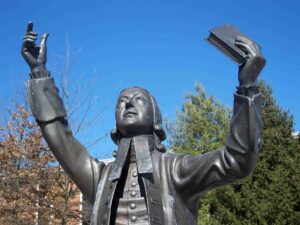What Should We Make of the Events at Asbury?
Evaluating the credibility of historical revivals is not a new exercise in the history of the Church. We are made aware that the multiplied “awakenings” of early American history are not all of a sort, and that some proved more credible than others. Iain Murray’s Revival and Revivalism is a particularly fine examination of these. Better known is Jonathan Edwards’s Yale-lecture-series-turned-book The Distinguishing Marks of a Work of the Spirit of God, a work that represents his faithful attempt to obey the Apostle John’s plea to “believe not every spirit, but try the spirits whether they are of God: because many false prophets are gone out into the world” (1 John 4:1). It is with this verse that we rightly begin, because it legitimates the question. We should—yeah must—evaluate the credibility of any claim to divine revival. Doing so is not an act of faithlessness or skepticism; it is an express act of obedience. It is those who incautiously accept every spirit as valid who are being disobedient.
That an outpouring of God’s redeeming grace might begin apart from churches is not a barrier to its authenticity. Indeed, lethargy in churches sometimes precipitates such works. It is not impossible for God to begin a work in homes, campground, or college chapels. It is not impossible, either, for God to begin a work using instruments other than officers of his church. Still, a valid work of God cannot long eschew the participation of churches. The Great Commission does not call NT believers merely to effect mere “decisions for Christ” (much less undefined motions of passion). It calls us to offer careful instruction, then baptize those who believe into local bodies, in which setting further instruction toward sustained obedience may be carried out (Matt 28:18–20). Ironically, the conversion “event” does not even make an appearance in the Great Commission.
It is as churches begin to intersect with the Asbury event that the fruits of revival will be either discovered or found wanting: When the passions settle, will true religious affections, practiced and cultivated within local assemblies, replace them? Will trite expressions of word, song, and testimony (which abound among new believers yet without shepherds) mature into serious and careful ones? Will false doctrines (which are routinely sown in any revival of religious interest) be exposed and denounced by the pillar and ground of the truth—the Christian Church (1 Tim 3:15; Titus 1:9; 1 John 4:1)? Will professions of faith be supplemented by the kinds of virtues that render one’s calling and election sure (2 Pet 1:3–11)? Will the long, slow work of sanctification begin?
Fervency of religious expression does not discredit it; but neither does it establish true religion. Frankly, it tells us almost nothing. The litmus tests of pure and undefiled religion, so James tells us, are (1) readiness to learn the Word in attentive silence, (2) sustained suppression of sinful impulses in both word and deed, (3) meek and lasting growth in holiness, and (4) the cultivation of eagerness to engage in Christian benevolence (James 1:19–26).
It is likely that in an event of this magnitude, at least some of these results will emerge. The question whether these will be isolated or widespread may take years to discover. We should not scoff at the possibility of God-wrought revival, but neither should we announce it hastily. Instead, we should head to church on Sunday and do our part to engage in the practice of true religion, praying earnestly that God will awaken others to this self-same pursuit.




Well stated. Thank you Mark
We often make too much of religious emotion, rather than observe spiritual motion. I’m reminded of Jonathan Edwards concerns about reality in the great awakening. As the Puritans said of such:. ” Time and the devil will tell’ …
It amazes me how reticent many are to even thank God for a measure of a spiritual awakening. Please do not even start with the discernment angle. I think some in the church would be unhappy if the angel Gabriel appeared. They would want Michael.
Those who have recently made professions of faith will need shepherds who will lead them. They need to be encouraged to read the Word and to begin to follow up in a Bible believing churches. I hope this will happen